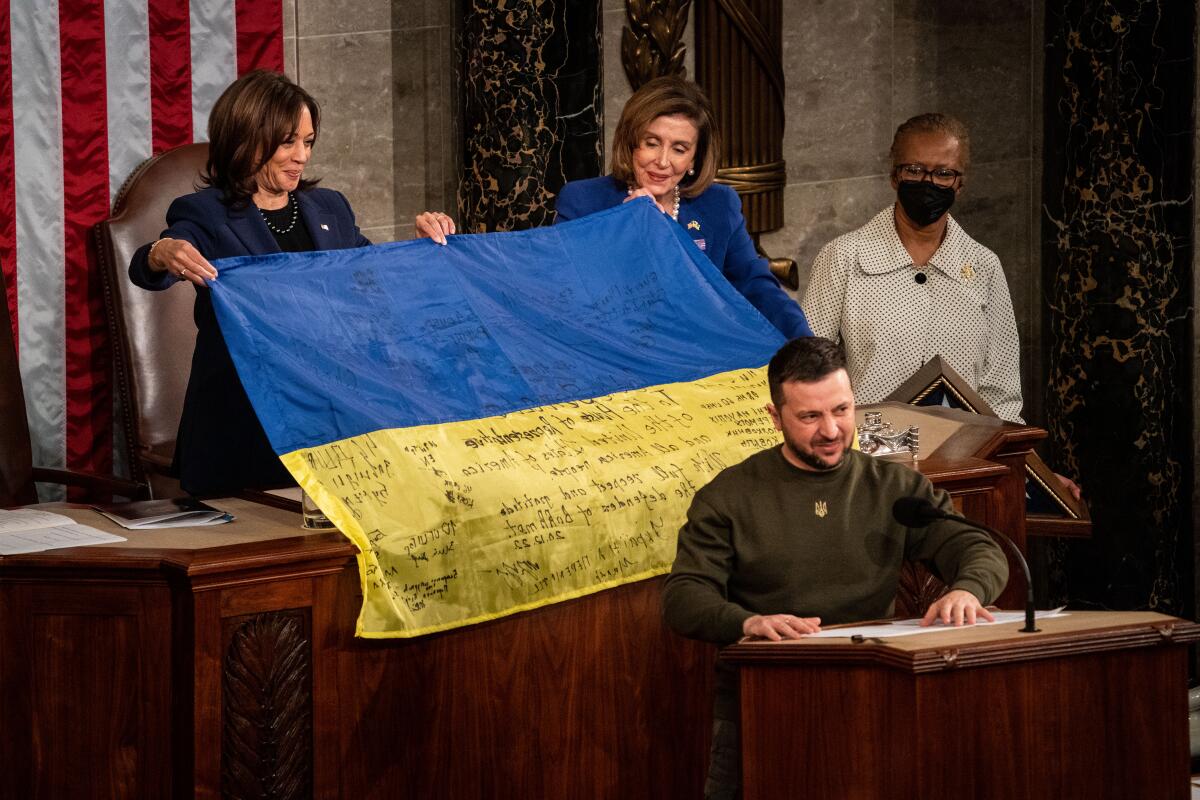Zelensky to Congress: ‘Your money is not charity’

WASHINGTON — Making a dramatic, risky wartime visit to Washington on Wednesday, Ukrainian President Volodymyr Zelensky strategized privately with President Biden at the White House and then, to repeated standing ovations, delivered an impassioned plea to Congress for sustained U.S. military aid.
“Your money is not charity,” Zelensky told the unusual joint session of Congress on Wednesday evening. “It is an investment in global security and democracy that we handle in the most responsible way.”
The Ukrainian leader, fresh from the front lines and making his first known trip outside of his country since Russia’s invasion 300 days ago, pressed a message of thanks to “ordinary” Americans for their support while also making the case for more help.
Throughout the day, he wore his drab olive fatigues as a glaring reminder of the war back home, even as he sat on the upholstered chairs of the Oval Office or addressed the suits and ties of Congress.
The mayor of Kyiv warns that some of the Ukrainian capital’s residents might have to be evacuated to places with more reliable essential services.
In addition to warm welcomes from Biden, administration officials and enthused members of Congress, Zelensky was greeted with the president’s announcement of $1.8 billion in new aid, including a sophisticated Patriot missile battery that Kyiv has long sought.
But despite mutual praise and appreciation and evident camaraderie between the two presidents, U.S. and Ukrainian officials remained at odds on several issues.
In an afternoon news conference at the White House, Zelensky made clear he wants more weapons than the U.S. is ready to provide.
Biden administration officials have insisted the surface-to-air Patriot missiles — along with all other weaponry the U.S. and NATO are supplying Ukraine — only be used defensively to deflect Russian attacks, and not for offensive operations inside Russian territory. Offensive aid to Ukraine would risk widening the conflict, U.S. officials have warned.
But Zelensky, after thanking Biden for the Patriot battery, said he’d be asking for another one right away.
“We’ve given Ukraine what they needed, when they needed to defend themselves,” Biden responded.
Asked what he considered a “fair” way to end the war, Zelensky bristled slightly and appeared to be responding to pressure from some Western officials to negotiate with Moscow.
“A just peace? I don’t know what a just peace is,” Zelensky said. “Just peace is no compromises to the sovereignty, freedom and territorial integrity of my country.
“How many parents lost their sons and daughters on the front lines?” he continued. “What is a just peace for them?”
In his speech to Congress, Zelensky said he had a 10-point plan for peace with Russia, but he did not elaborate.
Zelensky’s address was aimed, at least in part, at Republicans who have expressed doubt about continued aid to Ukraine. That group includes Rep. Kevin McCarthy of California, who is likely to become speaker of the House when the GOP takes control of the body next month.
The pair met privately before Zelensky’s address, and McCarthy later praised Zelensky’s remarks and spoke of the need to support Ukraine and the “free world.” But the GOP leader also repeated his previous opposition to a “blank check” for military aid. (In fact, U.S. aid for Ukraine is not unlimited or open ended, and each tranche has to be approved by Congress.)
Zelensky, who has a habit of citing allies’ history when trying to influence them, invoked America’s Revolutionary War and President Franklin D. Roosevelt’s decision to enter World War II in his speech.
He also repeatedly sought to tie Ukraine’s struggle with the broader fight against anti-democratic autocrats and “terrorists.” He mentioned Iran, calling it a terrorist nation supporting another “terrorist country”: Russia.
Although most of the members of Congress gave Zelensky numerous standing ovations, a tiny group of GOP radicals, including Rep. Matt Gaetz of Florida, looked at their phones and generally declined to applaud. “Hemorrhaging billions of taxpayer dollars for Ukraine while our country is in crisis is the definition of America Last,” Gaetz tweeted later.
But Zelensky mostly won praise for his performance, which he capped by presenting a Ukrainian flag from the battlefront to House Speaker Nancy Pelosi (D-San Francisco) and Vice President Kamala Harris, who stood behind him as he spoke.
“I told him that where Winston Churchill stood generations ago, so too does he tonight, not just as a president but as an ambassador for freedom itself,” Senate Majority Leader Charles E. Schumer (D-N.Y.) said, noting that he told Zelensky about his Jewish ancestry in Ukraine. Zelensky is also Jewish.
In remarks on the Senate floor earlier Wednesday, Senate Minority Leader Mitch McConnell (R-Ky.) said that continued support for Ukraine was not only morally right but “a direct investment in cold, hard, American interests.”
Defeating Russia, McConnell said, would also “send a stark warning” to China.
Zelensky, whose nightly video messages have served as a major morale booster for his people, has frequently relied on video communication to make impassioned pleas for help to national legislative bodies, the United Nations and gatherings of world leaders.
An in-person appearance in the capital of Ukraine’s most important ally carried extraordinary significance — and extreme risk. But the bipartisan expressions of support for Zelensky’s agenda suggested that his visit, fraught with danger and shrouded in extreme security measures, had paid off.
On Wednesday morning, just hours before Zelensky’s arrival, Biden announced the new tranche of aid for Ukraine. That aid will include the Patriot missile system Kyiv had requested for months, according to a senior administration official. The Pentagon calls the Patriot system “one of the world’s most advanced air defense capabilities.”
U.S. forces will train Ukrainians on using the system in a third country, the official said, and “Ukrainian troops will take that training back to their country to operate this battery.” A senior Defense Department official said the training would begin “very soon” but could take “several months” to complete, raising questions about how effective the new weapon will be during the crucial winter weeks ahead.
More aid is at stake. In Washington, lawmakers are preparing to vote on a $1.7-trillion end-of-year funding bill for 2023 that includes $45 billion of additional economic and security assistance for Ukraine. A senior administration official told reporters the White House is “confident” of continued bipartisan support for Kyiv, and predicted that Zelensky’s appearance on Capitol Hill would rally more votes to his cause.
“This isn’t about sending a message to a political party. This is about sending a message to Putin and sending a message to the world that America will be there for Ukraine for as long as it takes,” said the official, who briefed reporters on the condition of anonymity to discuss details of the trip.
Zelensky’s visit to Washington was made possible only by U.S. support that has allowed Ukrainian forces to “control the situation,” he told Biden in the Oval Office on Wednesday afternoon.
He presented Biden with a medal that had been awarded to a Ukrainian officer who captained a U.S.-supplied rocket battery. The officer, who met with Zelensky in the hotly contested front-line town of Bakhmut on Tuesday, told him to “give it to the very brave president.” The award is the cross for military merit, Zelensky said.
“Well, undeserved but much appreciated,” Biden said. He asked Zelensky to give the officer a U.S. challenge coin, a medallion given to honor military service.
In addition to his public appearances, Zelensky held hours of closed-door meetings with the president, members of the Cabinet and the U.S. national security team.
Zelensky’s meeting with Biden was his second appearance at the White House. The two leaders first met in September 2021, when Biden reiterated his administration’s commitment to “Ukraine’s sovereignty and territorial integrity in the face of Russian aggression” and American support for Kyiv’s “Euro-Atlantic aspirations.”
The Ukrainian president has become a household name in Washington, having played a key role in former President Trump’s first impeachment trial. As a newly elected president, Zelensky received a call from Trump threatening to cut off military aid to Ukraine unless he dug up dirt on Biden’s son, Hunter Biden. Joe Biden, then preparing to launch his presidential bid, had led an anticorruption push in Ukraine as vice president.
Ukraine had already been at limited war with Russia, after Putin invaded and illegally annexed Crimea, Ukraine’s southern Black Sea peninsula, in 2014.
Pelosi was one of several American politicians to compare Zelensky’s appearance in Washington this week to Churchill’s visit in late 1941 to win American support in World War II. Pelosi’s father, Thomas D’Alesandro Jr., was a member of the House at the time.
“Eighty-one years later this week, it is particularly poignant for me to be present when another heroic leader addresses the Congress in a time of war — and with Democracy itself on the line,” she wrote in a statement announcing the joint session.
Churchill stayed in the U.S. for several weeks after his 1941 speech to Congress before flying back, via Bermuda, to a Britain under siege. Zelensky was expected to leave Washington immediately. The Ukrainian president’s return home may be even more perilous than his trip to the U.S.: This time, Russia knows exactly where he is.
More to Read
Get the L.A. Times Politics newsletter
Deeply reported insights into legislation, politics and policy from Sacramento, Washington and beyond. In your inbox three times per week.
You may occasionally receive promotional content from the Los Angeles Times.














